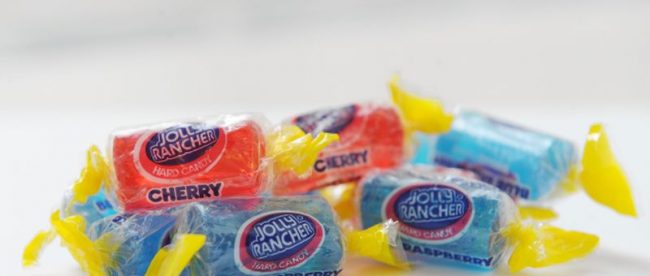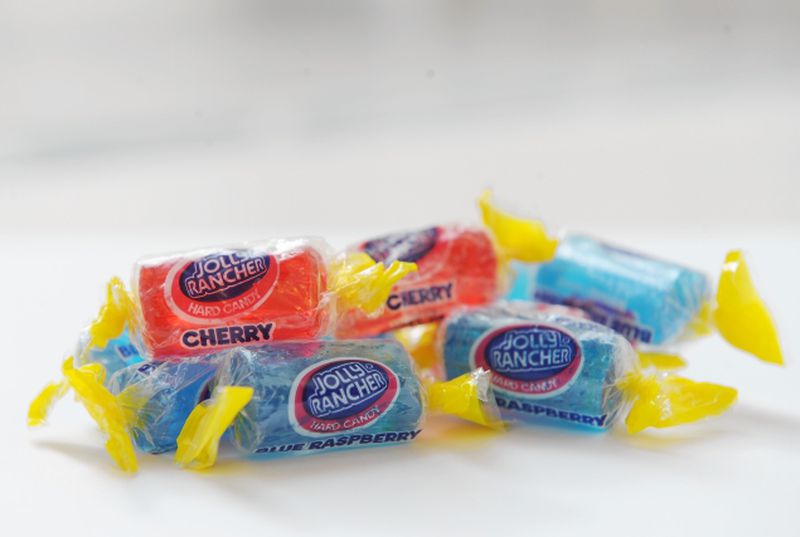The Sweet Mistake

In June of 2014, two men were walking around the Brooklyn, New York neighborhood of Coney Island, likely minding their own business. Police officers, though, suspected they were up to no good. For reasons unclear, the officers believed they had probable cause to search the men for weapons, drugs, or something else illicit.
The search turned up something amiss. Specifically, the police found some red and blue crystalized rocks which appeared to be crystal meth. A field test confirmed their suspicion, both men were placed under arrest for possession of narcotics and held in custody a day. As the New York Daily News reported, “two ‘red crystalline rocks of solid material’ and four “blue crystalline rocks of solid material’ were then subjected to a gas chromatography/mass spectrometry analysis at the NYPD lab,” in hopes to confirm the field test. But the tests came back with a different result. The “drugs” in question weren’t drugs.
They were Jolly Ranchers. Yes, the candy, seen below.

That’s a pretty big mistake to make, and it turned out to be an expensive one, too. The accused (and a friend who objected to the arrest at the time and was punched in the face for voicing his concerns) sued the police department. And about a year later, the NYPD forked over $33,000 to settle the case.
Ridiculous, yes. But amazingly, it’s not unique. It turns out that drug field tests have a sugar problem — while rare, the sweet substance may trigger a false positive for drugs. In 2015, for example, NPR reported that “64-year-old Daniel Rushing had just dropped off a friend at chemotherapy and was driving home an older woman from his church who worked at the 7-Eleven,” when police pulled him over for speeding. One of the officers “noticed some crystals on the floorboard of the car, and when officers used a field testing kit, the white substance tested positive for methamphetamine.” The actual culprit? Glaze from a Krispy Kreme donut. Rushing spent ten hours in jail; all charges were eventually dropped and Rushing got a $37,500 settlement for his trouble.
And these problems aren’t unique to small-time busts, either. In 2018, a North Carolina police department engaged in a months-long undercover investigation, trying to determine if an otherwise nondescript resident was selling heroin out of his or her home. After obtaining samples of a white, powdery substance, the police raided the home and arrested those involved. The seizure netted “nearly 13 pounds of fentanyl with an estimated street value of over $2 million,” according to a local news report; the sheriff called the bust “one of the largest seizures in the state.” A month later, though, lab results came back showing that the powder was sugar, not fentanyl (and with a street value of maybe fifty bucks).
So if you’re busted for drugs and you’ve been eating candy or baking a cake or the like, you may have an excuse. But don’t put this one to the test.
Bonus fact: Sugar isn’t an illegal drug, but it isn’t good for you either. And that’s true for monkeys, too — if they eat too much sugar, they’re prone to developing diabetes and losing their teeth. So to keep monkeys healthy, zoos have to manage their sugar intake — which in one case, means no bananas. As CNN reported, a zoo in England cut off their monkeys’ banana supply because “the high calorie and sugar content of bananas grown for human consumption — which are sweeter than those found in the wild — are bad for the monkeys’ health and can rot their teeth.” The monkeys were given “leafy veggies and sprouts” as a more healthful alternative.
From the Archives: The Curious Origins of Cotton Candy: The least likely profession to encourage kids to eat sugar?
